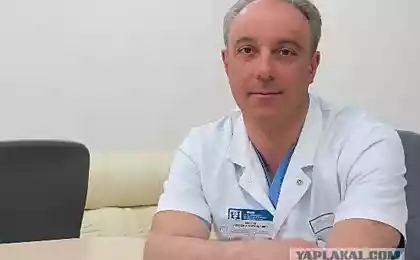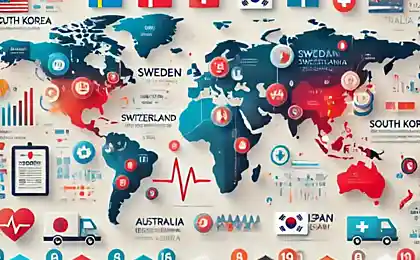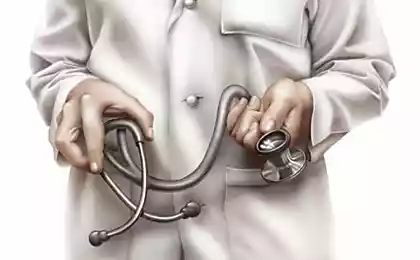534
"Guys, this is fake": what do you think about the innovation of the Russian doctors

© Delfina Picchio
The growing need in health care
According to research, the percentage of the population older than 60 years by 2050, will be doubled, life expectancy is increasing worldwide, including in Russia. The older the person, the more he suffers from chronic diseases, need of care and remote assistance. Another important trend is the focus on personal well-being: people want to live longer and be healthy.
"Treatment for us is still getting rid of the disease, but to achieve the health of the nation with this approach, it is impossible", — says marketing Director of the direction "Health" of the company Phillips Olga bershadskaya. In this regard, innovations arise at all stages of care. In the updated Russian health strategy are prevention, rehabilitation, and home medicine, much attention has been paid to a healthy lifestyle, or genetic information. However, rising costs for patients and the Federal health insurance Fund. The head of the portal Emias.info Dmitry Grechkin believes that these two trends for medical startups the particular importance played by the customer-oriented approach.
The excessive workload of doctors According to Vladimir Kovalskiy, CEO and co-founder of MEDESK, a major obstacle to the implementation of IT technologies in the work of doctors is their high employment: "the Doctor used to work with the patient, another process in the clinic, he does not perceive. Additional buttons, indicators mobile devices — this extra workload".
On the other side of the problem, said the head of the project "Health" Mail.ru Group Yevhen Paperny. He believes that in Russia "many doctors, they are poor, and some of them still remember what they were taught in the Institute". Therefore, in contrast to the Western medical IT, which is often aimed at automating processes in Russia, everything can be done much cheaper by a person with 20 years of medical experience, sitting on the phone.
The problem of employment and low salaries of doctors can be addressed through e-visits. According to Paperny, within the framework of evidence-based public health effectiveness of the e-visit has been confirmed for two dozen States. This, for example, back pain, respiratory and heart failure, asthma, multiple sclerosis, alcoholism. That is, if you allow a person to take pictures of the moles and send them to the doctor, the average survival rate when the disease of skin cancer due to early diagnosis will be higher than if people had the opportunity to go to the reception. But not many startups until it is understood. The difficulty is that in Russia from the point of view of responsibility e-visit does not yet have legal status. "But in the North-Zapadnogermanskaya district of Moscow you can talk on the phone with the doctor from the clinic, and he gets money for it. This is a revolutionary achievement of the Moscow health," says Paperny.
Unnecessary innovations As shown by a study by McKinsey in 2014, in which he referred to Eugene Paperny, the health prefer privacy, efficiency, usability, connectivity and compatibility. Innovations happen at the intersection of technology, but in order to be successful in innovation, "it is very important a deep understanding of what is happening in society, because you need to anticipate his needs," — said bershadskaya.
Knowledge of the requirements associated with many of the problems of startups. "Yes, mobile first atomic functional applications, wearable devices — proven trends," says Paperny. However, the first conclusion which is done in the aforementioned study by McKinsey, is that these services are everywhere, almost all tasks have decisions, but people don't really need. Most of the projects demonstrate the insufficient quality of the very targeted services, they are trying to offer. "The average startup in the vacuum, which likes to attach a "Like" button often forget that usually the user does not want to share these details," concludes Paperny. Specialized peripherals too much, but to study breast cancer, Parkinson's disease, asthma or diabetes, already GPS, gyroscope, touch screen and microphone. So maybe in the near future the importance of such devices will be reduced.
The key task of the state, according to Pastukhov for the Internet. It is to create a system that will be able to rank websites of medical start-UPS than by content, as do search engines, and utility. "This task needs to be solved at the level of the Ministry of health and Ministry of communications, have not yet made half a step in this direction", — said the expert.
The growth of private health care and problems of monetization At the moment in Russia there are about 12 thousand clinics, which together with dozens of other medical startups face the problem of monetization. According to Kowalski, the problem is that one company may not combine absolutely all spheres of activity of health. "Now we are gradually moving from chaos paper maps to implementation in the clinics 10-15 systems each containing some kind of report or download. But if you want to add your mobile app in this outline, you will encounter an insuperable precipice of many of these systems. Virtually impossible just automatically distribute the new service at all," he says.
The most important moment for a startup is to understand how to get to the Desk to the doctor. When you work with Directors of clinics need to understand that they should report with the HIF, with insurers, to retrieve data from laboratories all possible, be recorded in the database and so on. That is, you need to be able to speak the same language. In addition, you need to decide how your startup will make. It's usually the principle of "let's do some service, will gather a lot of data and then it somehow monetized". "Somehow" in health care does not work. Funding in this area is very hard, there is a vicious circle of financial flows, so it is important to understand how much it will cost your product and who will pay to properly integrate into this network.
"The goal of medical startups — to understand the niche in which they will carry the state," affirms venture investor in startups in the field of medicine, President of the "National health system", the owner of a network of clinics "New clinic" and the portal MedAboutMe Boris Pastukhov. In his opinion, the problem in the state, which owns the majority of clinics and hospitals, the contents of which are spent millions. Since neither startup has no such money, they need to finish building something that people really need. For example, to see the doctor, not getting out of bed. Many difficulties stem from the fact that medical data belong to the first category of personal data: exports were very difficult, and experts have yet to figure out whether it's right or not.
The ease of creating technological project Creator startup Cardiwear Michael Shagiyev believes that Russia is now fairly easy to create a technological project: "Russia — the leader of affordable engineers. There are a huge number of universities where you can find good and cheap developers".
There is no problem with entering the market. "As soon as you start to do something because the competition is very low, you immediately pay attention, says Shagiyev. — From the point of view of marketing and to market we have all happened automatically. In August last year, the project was at the level of ideas, in a few months we were on the telly the Federal and the state Duma. You just need to do." In his opinion, it is now possible to "shoot" with a minimal budget and quickly find all the right partners.
The doctor's conclusion: Yaroslav Ashikhmin, PhD, an internist, a cardiologist, member of the European society of cardiology, American heart Association, author of more than 75 scientific publications. Head medical and expert referral network of clinics "Alfa Health Center" "the Key problem is that we have very different views on the disease. The doctor — through the prism of suffering, not only in time but also in the future: I know that with my patient who has high cholesterol will be tomorrow when he dies of a heart attack, and therefore have the opportunity to make a suggestion. There are pathomorphology, molecular biologists who look at the disease through a variety of devices, Ministry of health through the prism of mortality decline, chief financial officer — through the lens of making money. All these people have phenomenally low competence. We have no understanding. Startups do not know the real needs and methods of care to a specific person. As a rule, they are very bad shared psychological elements of suffering, ill see forecast. I know a lot of teams who have been scrapping the consciousness after they understood it. But the device is already there, and it needs to sell. And so everywhere: in America, Russia.
The biggest mistake that makes most startups: they think, for example, improvement in ECG means the improvement of clinical situation. But this is not always the case. Sometimes a person takes a drug every time he's getting better, and then he dies. People who don't work in medicine, it is very difficult to understand one thing that is perfectly clear to the doctors — the stronger the disease, the more aggressive should be the treatment aimed at improving prognosis. In addition, if the drug is more effective, he always has a large number of effects. We always look at the risk-benefit ratio for a particular patient.
Or, for example, there is a new system that determines what state and more flu on the number of requests of the symptoms of the common cold in search engines. Such methods are very questionable, as yet not proved its effectiveness. We don't know how to work with Big Data. If it happens, will be a revolution in medicine. But now everything happens only through randomized placebo-controlled trials where neither the doctor nor the patient nor the statistics do not know who kind of research method, device or medication is necessary. For startups that want to make the device, it is important to look at the outcomes of these studies because of its device may make it worse: people will feel that something is improving, but really in the end it will lead to death. There are many startups that are trying to do what the public does not need, and they are not responsible for it. Doctors often block such projects.
The most terrible and unnecessary — the analyzers of body composition, which measures the amount of adipose tissue. Yes, fat is bad, but, in contrast to its quantity, it is much more important, where it is distributed. With this device you can not identify the pattern of fat distribution. Or take the example Cardiwear here present, whose motto is "Clothing that monitors your heart." As a practicing cardiologist, I don't see this application. ECG is not an indicator of the early stages of a heart attack on it is almost not reflected, based only on it, no physical exertion. I made a screenshot of the site, it is in the picture — ginepraia serious arrhythmia, which is difficult to define. Moreover, it is recording quality with the clothes can not be obtained. It is a fake. Yes, you can come to the Council or to be on TV, but we, doctors, are going to block this product. Information that something didn't work, either: an array of unpublished data is huge, you know almost 80% of studies of devices that failed.
The only approach that works today, is translational medicine. Initially the need is formulated, a hypothesis, searched for solutions, then the project is in preclinical studies, then in clinical. At each stage of the loyalty concept is tested by clinicians who treat the disease or work to prevent in the early stages. In the end, you should receive a device that treats the same disease. This scheme works only refer to clinicians who have published in scientific journals. The only way to reveal today a decent man.
Same thing with health care information systems: they are made for anyone, except doctors. In Russia hate MIS. But it will turn out, if there is a dialogue between a doctor and a programmer". published
Source: theoryandpractice.ru























